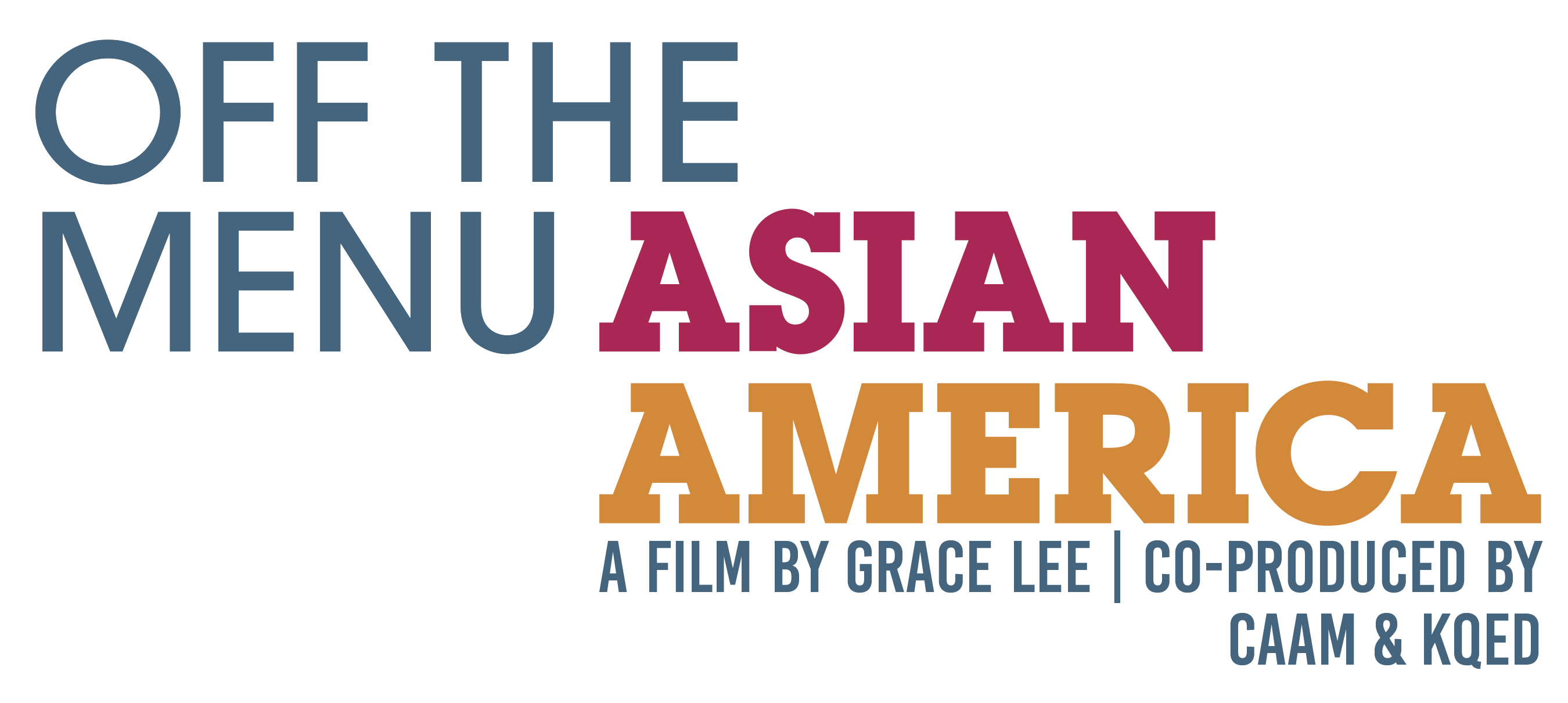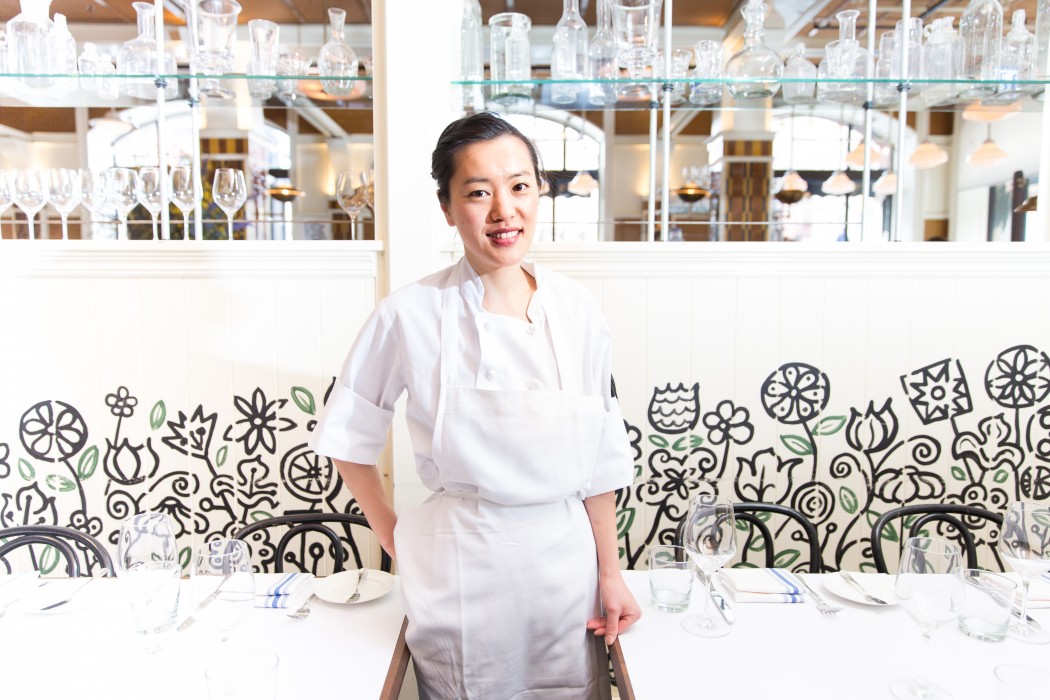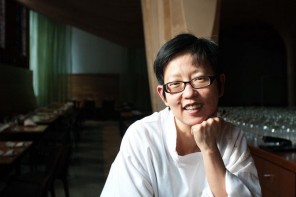If Jennifer Yee had known the level of success she would achieve making pastries, choosing to go to culinary school right away instead of college would have been, well, a piece of cake. With two James Beard Award nominations for Outstanding Pastry Chef, a Food and Wine Best New Pastry Chef accolade and a fig tart that New York Times critic Pete Wells would call one of the best dishes of 2013, her success can be traced back to a childhood fascination with the sweeter side of a meal. Contrary to the whimsical, bright desserts she serves at Lafayette, Yee holds a practical view of the kitchen as an ecosystem of manual labor, tasked with creating products that keep diners coming back. As suspected, they do.
—Diana Emiko Tsuchida
How do you make desserts important? What is the experience you want to give to a diner?
There is a challenge there because you always have to take into consideration the fact that the diner has already had a full meal. What is this person going to want to want after they’ve had their steak frites and their foie gras? The thing that we do pretty well here is to create desserts that are satisfying and fun, full of color and flavor but also light. So even with our dark chocolate dessert, it’s still something that’s slightly refreshing and not too rich and not too sweet and cloying so it really does finish off the meal on a high note. That’s the main objective when I’m creating a dessert. The whole purpose of my job is to finish the meal on a high note. I really strive for something that’s going to wake people up.
Describe your background. Did anything prepare you for a life in food?
I actually grew up in the Bay Area. I studied interior design at San Jose State, so all of my early years were spent in the Bay Area. When I was growing up, my parents divorced very early. So growing up, my mom and I lived in the same apartment complex as my uncle so we were very close in that way and like many Asian families, family events were focused around food and banquets or a dining table. So food was always a part of my life, not necessarily cooking, but the uncle who lived in the same building as me was very much into cooking and he was owned and run a couple of small restaurants throughout his time. And so when I came home from school he would always be watching those old school PBS shows (Jacque Pepin, Great Chefs) and I really enjoyed watching them as just entertainment, it was just fun to watch people cook. And I always enjoyed the pastry or dessert portion of those shows. A lot of people grew up baking with their mom or baking with their family and I did the same thing and I loved it and it just kind of stuck. I started to bake on my own, like make a cake from the box, all by myself. Back then I thought that was making a cake from scratch because you actually saw it bake. And I think from very early on I knew that baking or pastry or desserts in some capacity was going to be in the future.
You veered off the path a little bit. Was it because it wasn’t a realistic career?
In high school, I would experiment in the kitchen and Martha Stewart was a very big influence on me so I was trying out things from her books. My parents saw it as a passionate hobby too, but they didn’t see it as a lucrative career. At that time, cooking didn’t have the popularity that it does now. Back then in high school I remember reading an article about Pichet Ong and I bought Claudia Fleming’s book, so you were just starting to see a glimpse of the appreciation of the pastry chef in the restaurant or the media as a career. My other interest and passion was interior design and architecture so I went into that major at SJSU. Even in high school, I was really set on going into a culinary college. But they were so adamant about me getting a four year degree, like a Bachelor’s degree, they really wanted me to get that base education first. After graduation I did work in the interior world for about a year and then finally made the switch, I got a job in a restaurant plating desserts, Home Restaurant on Market Street. I actually worked two jobs during that time because I made my decision to go back to culinary school.
Did you ever experience or feel discrimination?
I don’t know if I was even aware enough to recognize that, I don’t know if I was that self-conscious enough. I think my challenges in the kitchen were due to worrying if I was good enough. Me being a woman or me being Asian wasn’t the priority distraction. I worked in London for three years and I applied to a French restaurant and they told me that if I didn’t speak French I couldn’t work there because everyone spoke French. I mean ,that was a language discrimination but I never really felt because I was a girl or I was Asian that I couldn’t get the job. It could have been complete ignorance too or aloofness to the real world but I never felt it and maybe I didn’t allow myself to feel it.
Do you feel it’s just the nature of a kitchen that everyone’s at the ground level?
The kitchen here is very multiethnic and very multicultural, I think you can get all walks of life coming through a kitchen. I think maybe even cooks and people who want to cook might even come from a lower class system, I don’t know. It’s a blue collar field, I don’t think it has anything to do with race, it might have more to do with class. Just because it’s something that pretty much anyone can do–you don’t need a college education to cook, you don’t need a high IQ to cook. Obviously as you grow within the field, yes you’re going to need to use your brain, you’re going to need to be smart to have a business head but to get yourself into the kitchen, you don’t have to do much. It is absolutely a manual trade. I don’t think people should ever forget that. That’s what you’re here to produce, you’re here to make something, make as much of it as possible and hopefully keep people happy at the same time but it very much is a blue collar trade.
What is your ultimate career goal?
I would love to be able to work with my husband. He does nothing to do with food he works in a bank. My husband has a passion for wine and a passion for food and service so for us to maybe create something together that would be a dream come true. I do believe we can make something work in the future.
What mentorship would you instill in your kitchen?
One of my biggest pastry mentors is David Carmichael because he had such a great attitude in the kitchen and he made working in the kitchen such a pleasure. He didn’t let you slack around either but he made pastry fun and important at the same time. So I think I would like to pass that down to people who passed that down to people who work for me now and people who will work for me. I think taking the time out to educate your staff is so important because that’s the only way to incubate that passion that they already have and really allow it to flourish and it get them to get creative and then you could collaborate with your staff and you might come up with something that you may have no come up with on your own. Everyone’s different and it’s a chefs job to cultivate that.
What do you want to be remembered for?
I try to not think of myself in that way because I just do a job, I do a job that I love and I want to be appreciated for the job that I do but I’m not trying to leave any sort of legacy. But I guess I would hope that people that know me or who have had my food or people that’ve worked for me will remember that I worked just as hard as everyone else, I love what I do, and that I had fun. And still to this day, I have fun.
+ + +
 This story is a part of Off the Menu: Asian America, a multimedia project between the Center for Asian American Media and KQED, featuring a one-hour PBS primetime special by award-winning filmmaker Grace Lee (American Revolutionary: The Evolution of Grace Lee Boggs), original stories and web content.
This story is a part of Off the Menu: Asian America, a multimedia project between the Center for Asian American Media and KQED, featuring a one-hour PBS primetime special by award-winning filmmaker Grace Lee (American Revolutionary: The Evolution of Grace Lee Boggs), original stories and web content.





Pingback: Google()